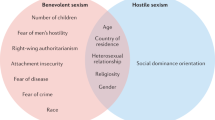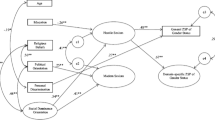Abstract
Two longitudinal studies examined the system-justifying effect of women’s benevolent sexist ideology in New Zealand female undergraduate samples. Women’s endorsement of benevolent sexism predicted longitudinal changes in hostile sexist attitudes toward their gender over 6-month (study 1; n = 117) and 12-month (study 2; n = 76) periods. Consistent with Ambivalent Sexism Theory, these findings indicate that women’s endorsement of benevolent sexism disarms resistance to, and increases their endorsement of, more hostile forms of sexism directed toward their gender. However, the disarming effect of benevolent sexism occurred only for women high in Right-Wing Authoritarianism (study 2), suggesting that threat-driven authoritarian motivations for collective security and social cohesion cause women to actively participate in an ideological system that perpetuates gender inequality.



Similar content being viewed by others
References
Abrams, D., Viki, G. T., Masser, B., & Bohner, G. (2003). Perceptions of stranger and acquaintance rape: The role of benevolent and hostile sexism in victim blame and rape proclivity. Journal of Personality and Social Psychology, 84, 111–125.
Aiken, L. S., & West, S. G. (1991). Multiple regression: Testing and interpreting interactions. London, UK: Sage.
Altemeyer, B. (1996). The authoritarian spectre. London, England: Harvard University Press.
Duckitt, J. (2001). A dual-process cognitive-motivational theory of ideology and prejudice. In M. P. Zanna, (Ed.), Advances in experimental social psychology (Vol. 33, pp. 41–113). New York: Academic.
Duckitt, J., & Sibley, C. G. (2007a). A dual process model of ideological attitudes and system justification. In J. T. Jost, A. C. Kay, & H. Thorisdottir (Eds.), Social and psychological bases of ideology and system justification. In press.
Duckitt, J., & Sibley, C. G. (2007b). Right-wing authoritarianism, social dominance orientation and the dimensions of generalized prejudice. European Journal of Personality, 21, 113–130.
Duckitt, J., Wagner, C., du Plessis, I., & Birum, I. (2002). The psychological bases of ideology and prejudice: Testing a dual process model. Journal of Personality and Social Psychology, 83, 75–93.
Fischer, A. R. (2006). Women’s benevolent sexism as reaction to hostility. Psychology of Women Quarterly, 30, 410–416.
Fiske, S. T., Xu, J., Cuddy, A. C., & Glick, P. (1999). (Dis)respecting versus (dis)liking: Status and interdependence predict ambivalent stereotypes of competence and warmth. Journal of Social Issues, 55, 473–489.
Glick, P. (2006). Ambivalent sexism, power distance, and gender inequality across cultures. In S. Guimond (Ed.), Social comparison and social psychology: Understanding cognition, intergroup relations, and culture (pp. 283–302). New York: Cambridge University Press.
Glick, P., Diebold, J., Bailey-Werner, B., & Zhu, L. (1997). The two faces of Adam: Ambivalent sexism and polarized attitudes toward women. Personality and Social Psychology Bulletin, 23, 1323–1334.
Glick, P., & Fiske, S. T. (1996). The ambivalent sexism inventory: Differentiating hostile and benevolent sexism. Journal of Personality and Social Psychology, 70, 491–512.
Glick, P., & Fiske, S. T. (2001a). Ambivalent stereotypes as legitimizing ideologies: Differentiating paternalistic and envious prejudice. In J. T. Jost & B Major, (Eds.), The psychology of legitimacy: Emerging perspectives on ideology, justice, and intergroup relations (pp. 278–306). Cambridge: Cambridge University Press.
Glick, P., & Fiske, S. T. (2001b). An ambivalent alliance: Hostile and benevolent sexism as complementary justifications for gender inequality. American Psychologist, 56, 109–118.
Glick, P., Fiske, S. T., Masser, B., Manganelli, A. M., Huang, L., Castro, Y. R., et al. (2004). Bad but bold: Ambivalent attitudes toward men predict gender inequality in 16 nations. Journal of Personality and Social Psychology, 86, 713–728.
Glick, P., Fiske, S. T., Mladinic, A., Saiz, J. L., Abrams, D., Masser, B., et al. (2000). Beyond prejudice as simple antipathy: Hostile and benevolent sexism across cultures. Journal of Personality and Social Psychology, 79, 763–775.
Hofstede, G. (2001). Culture’s consequences: Comparing values, behaviors, institutions, and organizations across nations (2nd ed.). Thousand Oaks, CA: Sage.
Hu, L.-T., & Bentler, P.M. (1999). Cutoff criteria for fit indexes in covariance structure analysis: Conventional criteria versus new alternatives. Structural Equation Modeling, 6, 1–55.
Jackman, M. R. (1994). The velvet glove: Paternalism and conflict in gender, class, and race relations. Berkley: University of California Press.
Johannesen-Schmidt, M. C., & Eagly, A. H. (2002). Another look at sex differences in preferred mate characteristics: The effects of endorsing the traditional female gender role. Psychology of Women Quarterly, 26, 322–328.
Jost, J. T., & Banaji, M. (1994). The role of stereotyping in system-justification and the production of false consciousness. British Journal of Social Psychology, 22, 1–27.
Jost, J. T., Banaji, M. R., & Nosek, B. A. (2004). A decade of system justification theory: Accumulated evidence of conscious and unconscious bolstering of the status quo. Political Psychology, 25, 881–919.
Jost, J. T., & Kay, A. C. (2005). Exposure to benevolent sexism and complementary gender stereotypes: Consequences for specific and diffuse forms of system justification. Journal of Personality and Social Psychology, 88, 498–509.
Kilianski, S. E., & Rudman, L. A. (1998). Wanting it both ways: Do women approve of benevolent sexism? Sex Roles, 39, 333–352.
Sibley, C. G., Robertson, A., & Wilson, M. S. (2006). Social dominance orientation and right-wing authoritarianism: Additive and interactive effects. Political Psychology, 27, 755–768.
Sibley, C. G., & Wilson, M. S. (2004). Differentiating hostile and BS attitudes toward positive and negative sexual female subtypes. Sex Roles, 51, 687–696.
Sibley, C. G., Wilson, M. S., & Duckitt, J. (2007a). Antecedents of men’s hostile and benevolent sexism: The dual roles of social dominance orientation and right-wing authoritarianism. Personality and Social Psychology Bulletin, 33, 160–172.
Sibley, C. G., Wilson, M. S., & Duckitt, J. (2007b). Effects of dangerous and competitive worldviews on right-wing authoritarianism and social dominance orientation over a five-month period. Political Psychology, 28, 357–371.
Sidanius, J., & Pratto, F. (1999). Social dominance: An intergroup theory of social hierarchy and oppression. Cambridge: Cambridge University Press.
Tavris, C., & Wade, C. (1984). The longest war: Sex differences in perspective (2nd ed.). San Diego, CA: Harcourt Brace Jovanovich.
Van Hiel, A., Pandelaere, M., & Duriez, B. (2004). The impact of need for closure on conservative beliefs and racism: Differential mediation by authoritarian submission and authoritarian dominance. Personality and Social Psychology Bulletin, 30, 824–837.
Acknowledgements
We thank Peter Glick and Andrew Robertson for their helpful comments on an earlier version of the manuscript.
Author information
Authors and Affiliations
Corresponding author
Rights and permissions
About this article
Cite this article
Sibley, C.G., Overall, N.C. & Duckitt, J. When Women Become More Hostilely Sexist toward their Gender: The System-Justifying Effect of Benevolent Sexism. Sex Roles 57, 743–754 (2007). https://doi.org/10.1007/s11199-007-9306-1
Received:
Accepted:
Published:
Issue Date:
DOI: https://doi.org/10.1007/s11199-007-9306-1




